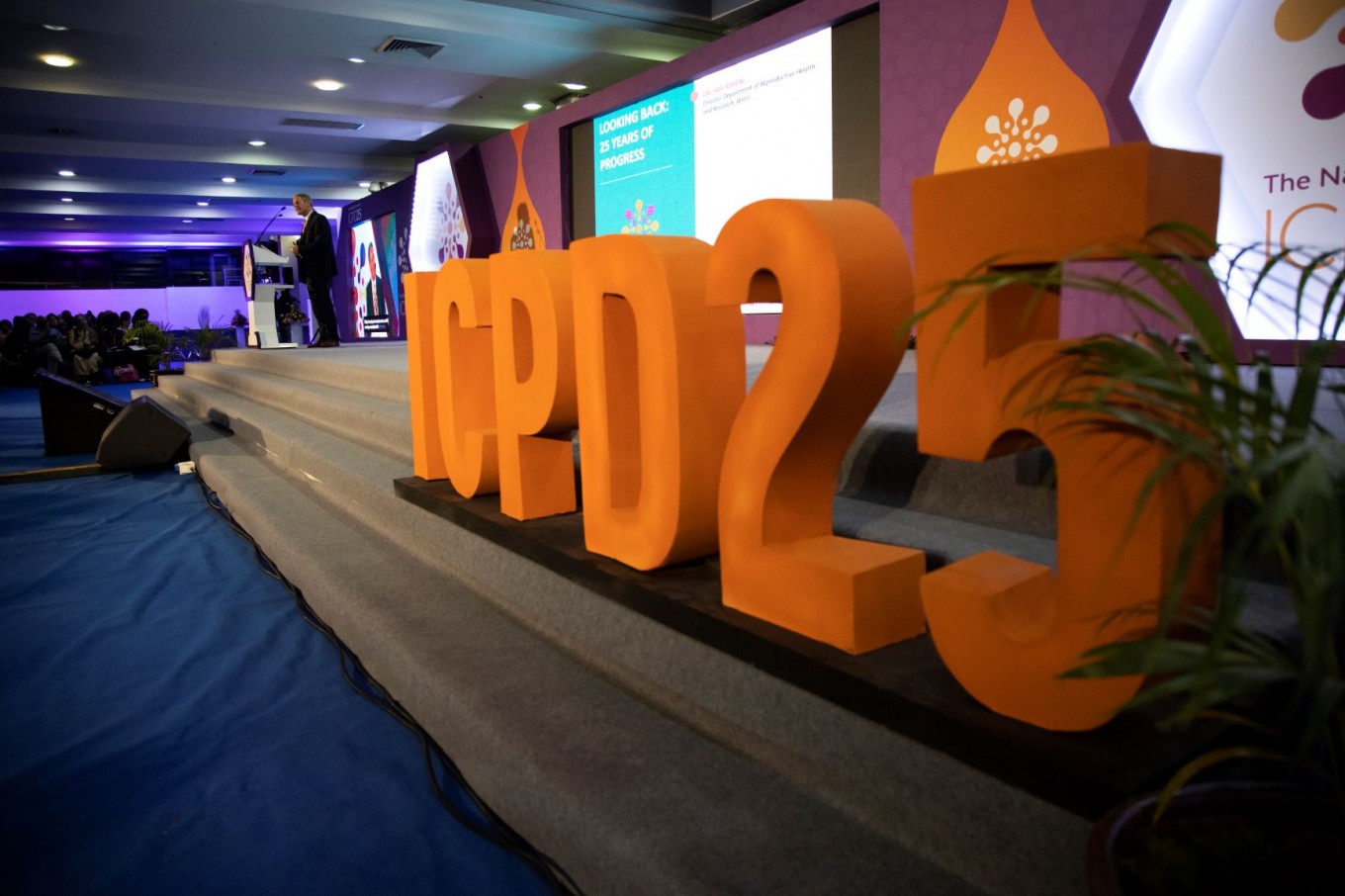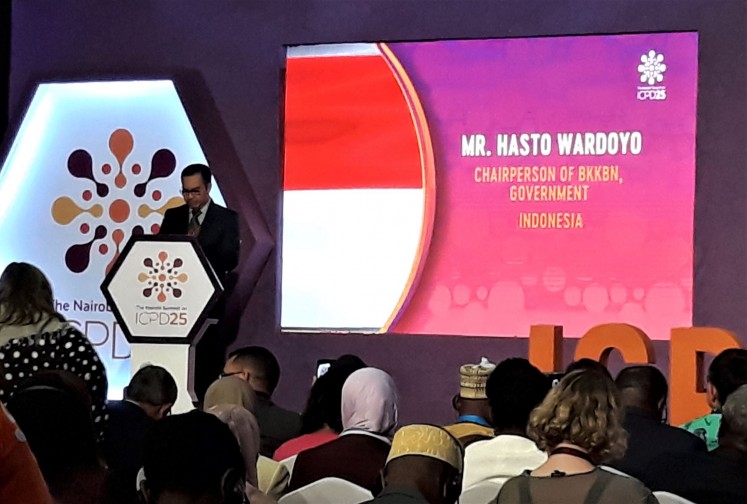Popular Reads
Top Results
Can't find what you're looking for?
View all search resultsPopular Reads
Top Results
Can't find what you're looking for?
View all search resultsIndonesia commits to ICPD promises, but not endorse Nairobi Summit statement
The Indonesian government stops short of fully endorsing a new statement coming out the population and development summit in Nairobi, Kenya.
Change text size
Gift Premium Articles
to Anyone
T
he Indonesian government insisted on Wednesday its strong commitment to living up to the promise made during the landmark International Conference on Population and Development (ICPD) in Cairo, Egypt 25 years ago.
However, it fell short of endorsing a new statement coming out at the three-day Nairobi Summit on ICPD25, held until Thursday, to accelerate efforts to meet the promises.
Making his point: National Population and Family Planning Board (BKKBN) chairman Hasto Wardoyo delivers Indonesia's Commitment Statement at the Nairobi Summit on ICPD25 in Kenya. (JP/Stevie Emilia)National Population and Family Planning Board (BKKBN) chairman Hasto Wardoyo, who led Indonesia’s some 30-member delegation to the Nairobi Summit, said Indonesia’s commitment to the implementation of the ICPD Program of Action remained strong and non-negotiable.
“While appreciating all efforts of the co-conveners, we are not in the position to endorse the Nairobi Statement due to our national regulations and policies,” he said in his Commitment Statement speech on Wednesday, without offering more details.
The non-binding Nairobi Statement is a forward-looking framework of commitments to complete the unfinished business of Cairo’s program of action. It is not a negotiated outcome like in most other summits but it is grounded in the 2030 Agenda for Sustainable Development.
The statement points to areas where more progress and specific commitments are urgently needed. It also reflects the inextricable links between women’s and girls’ empowerment, sexual and reproductive health and rights and sustainable development.
In Cairo, 179 governments, including Indonesia, adopted a breakthrough action plan that put people first, with women’s empowerment and sexual and reproductive health for all.
They agreed that sexual and reproductive health is a human right, that no mother should die while giving life, and that gender-based violence and discrimination have no place in the modern world.
Significant advances made today, however, are overshadowed by the fact the world has failed to deliver on the promise – and progress has been unacceptably slow. And the Nairobi Summit aims to make governments accelerate the promise.
Hasto said that in the past 25 years since ICPD, Indonesia had achieved several targets in the context of the 2030 Agenda of Sustainable Development.
“Regulations, policies and strategies on reproductive health, family planning and prevention of violence against women and girls are in place, including within our Universal Health Coverage,” he said.
He said real results had been achieved in the past 25 years, including the use of modern contraceptives, which has reached more than 50 percent; the age-specific fertility rate for girls decreased to 36 per 1,000 women; and the number of skilled birth attendants reached 90 percent.
Despite all this progress, he pointed out some unfinished business Indonesia had to deal with, such as high maternal mortality, domestic violence and child marriage.
Millions of women and girls in Indonesia still cannot exercise their sexual and reproductive health rights.
Every year, around 10.6 percent of women who do not want to have any more children do not use any family planning methods for various reasons, such as a fear of side effects, not having access to information and services, not having money to pay for the services, or being hindered by cultural/religious beliefs.
In 2015, around 15,509 women died of preventable causes linked to pregnancy and childbirth; while violence against women remains high as one in three women have experienced violence, not just at home but also in public spaces.
Child marriage remains a big issue, with one in four girls aged 20 to 24 married before the age of 18.
Hasto said Indonesia was pushing forward the ICPD commitments into national priorities: ending unmet need for family planning; ending preventable maternal death; and ending violence and harmful practices against women and girls.
To maintain inclusive concrete measures, he said the government planned to, among other things, increase the national budget on family planning, increase the minimum marriageable age to 19 years old and endorse the law on fighting sexual violence in all aspects of life.
The government also plans to fully integrate family planning, reproductive and maternal health care under Universal Health Coverage; committing to attain 100 percent standardized antenatal care and skilled birth attendance for all mothers in Indonesia; and improving public-private partnership to fully support the national commitments.
The government’s decision is likely made to avoid controversies back home, mainly with religious groups, since some think that the statement calls for the legalization of abortion, while in fact it does not.
When it comes to abortion, the Program of Action clearly states the legality of abortion is the prerogative of each sovereign state and where the abortion is not against the law, it should be safe and accessible.
The 179 governments that adopted the Program of Action agreed that abortion should not be used as a method of family planning, and that contraception should be made available and accessible to reduce the risk of unintended pregnancy and minimize recourse to abortion.
Delegation member Alissa Wahid of Islamic organization Nahdlatul Ulama’s family’s welfare organization LKK NU said the government should be realistic in dealing with the unmet needs and get the data right.
“If the problem [for slow progress in reaching the unmet goals] has something to do with religious or community views, the government should find the way out. must find a solution, not just let it be,” she said.











